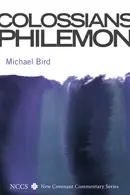

Colossians and Philemon
in New Covenant Commentary Series
Pages
192
Publisher
Cascade Books
Published
2009
ISBN-13
9781606081310
Michael Bird's commentary on Colossians and Philemon in the New Covenant Commentary Series pays close attention to the socio-historical context, the flow and dynamics of the text, their argumentative strategy, theological message, and the meaning of Colossians and Philemon for the contemporary church today. Bird situates Colossians in the context of Paul's Ephesian ministry and describes how Paul attempts to persuade a congregation in the Lycus Valley to remain firm in the gospel and to grasp the cosmic majesty of Jesus Christ over and against the views of certain Jewish mystics who have thrown the Colossians into confusion. He shows how, in the letter to Philemon, Paul intercedes for a slave estranged from his master through a carefully crafted feat of pastoral persuasion from a missionary friend of Philemon. The commentary combines exegetical insight, rhetorical analysis, theological exposition, and practical application all in one short volume. Bird shows Paul at work as a theologian, pastor, and missionary in his letters to the Colossians and Philemon.
Collections
This book appears in the following featured collections.
- Recommended New Testament Commentaries for Evangelical Pastors by Thomas R. Schreiner
Reviews
Bird, a respected New Testament theologian, offers a readable “state-of-the-discipline” exposition of Colossians.
[Full Review]
The introduction of the commentary was very, very good, perhaps even the strength of the commentary. Bird deals with the question of authorship at some length, clearly exposing weaknesses in arguments against Pauline authorship. In particular, he notes that the language in Colossians is different than the undisputed Paulines because Paul quotes a lot of traditional material and the opponents he's facing are a bit different than the Judaizers (6-7). It is not fair to say, though, that Bird believes that Pauline authorship of Colossians is of the same nature as Pauline authorship of Galatians. He sees it as being co-authored by Paul, Timothy, and perhaps others. This accounts for some of the distinctiveness of Colossians when compared to the undisputed Pauline epistles. The most detailed and helpful portion of the introduction is the assessment of the Colossian philosophy (15-26). Bird surveys the scholarly landscape and eventually settles on a calling it a form of Jewish mysticism. Introductory matters related to Philemon are briefly but adequately addressed.
The commentary proper was very strong. Bird is an excellent writer and he presents his viewpoint in a compelling way. The most remarkable aspect of this commentary was its evenness. I never felt like there was a section where Bird didn't have much to say and hadn't thought deeply about the text. The main body of the commentary is a running explanation of the letter. Bird does an admirable job of keeping the big picture of what Paul is doing in the letter in full view, relating each section to the whole. This makes the commentary an enjoyable read and very helpful for someone looking to get a quick grasp on any particular passage or the book as a whole. Technical discussions related to Greek grammar and other matters are relegated to the footnotes (there's more detail on grammatical issues here than one might expect for a commentary of this nature). The sections on 'Fusing the Horizons' were top notch providing pastors with brief but rich ministry-shaping reflections on topics such as The Global Church (see a snippet here), Common Faith, and Ministerial Formation. Bird writes as one who writes for the church, and not just in the 'Fusing the Horizons' sections. Throughout the commentary he draws out ecclesial themes, especially how God's people should function; both at the local church setting and more widely (often by describing Paul's theology - one must have ears to hear).
All in all this is a commentary worth deep engagement. The more time spent dwelling on Bird's attempt to think Paul's thoughts after him, the more one will get out of it, particularly on Colossians. I think that Bird nails his audience right on. It will be a helpful addition to any pastor's or studious lay person's library. If you want a commentary that gets to the point while not being shallow or unsatisfying then you'll love this commentary.
[Full Review]
The best adjective to describe the Philemon commentary is 'solid.' I didn't gain any new insights, but there also wasn't any spot where I really disagreed either.
[Full Review]

